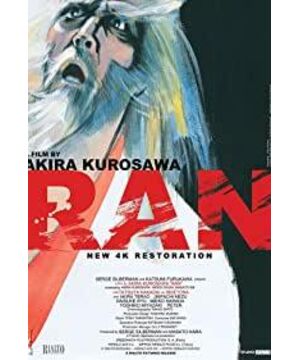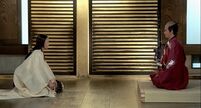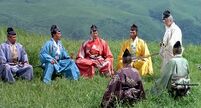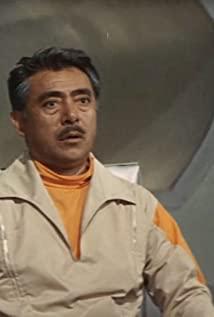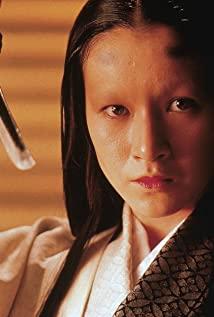http://qfmeng.blogbus.com/logs/151532464.html
Chaos (1985)
This is the last Kurosawa Akira in IMDB250 Movie. After watching a few of his films, I liked his films a little, so I didn't plan to skip this film and just finished watching it. But this time I was wrong. This movie is quite ugly, and the process of watching it is very painful.
The length of the film is not short, reaching 160 minutes, nearly three hours, but the plot of the film is not complicated. A very old old city lord has three sons - Taro, Erlang and Saburo, and has three cities under his jurisdiction. One day in the process of hunting, the old city lord decided to abdicate and give up the rule of the ethnic group and the city lord to Taro. Taro and Erlang were very happy, but Saburo and an old minister objected. The old city lord was very unhappy with their opposition and decided to exile the two of them. Later, the exiled Saburo was accepted as his son-in-law by the old comrade-in-arms of the old city master. Taro, who became the leader, showed the old city lord's face at the instigation of his wife, and drove him out of the city. The old city lord came to go to Erlang, but Erlang only wanted to take in his father, and the rest, including the guards, were not accepted. In a fit of rage, the old city owner had no choice but to leave Erlang's city and wander in the wild. In the wild, the old city lord saw the exiled old minister, learned the news of Saburo, and learned that Saburo's castle had been taken over by Taro. Under the suggestion of another old minister, the old city lords came to the third city. However, they were ambushed by Taro, and all the guards of the old city lord were killed during the battle. Moreover, Taro was also killed by Erlang's men, Erlang became the new leader, and he let go of his seemingly crazy father. Taro's wife is vicious, she confuses Erlang and asks him to kill his main room, Erlang agrees to her. The old city lord seemed crazy, but he was not crazy. He wandered in the city that burned down when he was young, reminiscing about the past. Saburo led the army to pick up his father, Erlang decided to agree to Saburo's request under the instigation of Taro's wife, so as to take the opportunity to kill the old city lord. The next battle began, and Saburo won the victory because of the support of the old city owner and two old comrades. However, when the father and son were about to go back, Saburo was shot and killed, and the old city owner also died when he saw this scene. In Erlang City, Erlang's subordinates saw the head of Erlang's main room, knowing that this was the order of Taro's wife, and killed Taro's wife in a rage. In the end, Taro, Saburo, the old city owner, Taro's wife, and Erlang's wife were all killed. This is a war without a winner.
The story of this movie is not complicated, but it is messy, which really fits the name of the movie - mess! It tells the story of the power struggle in Japan in ancient times. Through the description of the film, we can see that people can give up anything in order to gain power. Family, friendship, love, loyalty and trust are no longer important. Sons can kill their fathers, husbands can kill their wives, and subordinates can kill their masters. What kind of benevolence, righteousness, morality, loyalty and virtue are worthless in their eyes. In short, for the sake of rights and interests, anything can be abandoned. The story of the movie is quite cruel. It fully shows the ugly side of human nature to the audience, and the process of watching it is very depressing. Personally, I don't like this kind of movie, it's "ugly".
The length of the movie is super long because the pacing is super slow. Except for some battle scenes, the film is a dialogue and silent picture between the characters. In these dialogue scenes, although there are few lines of dialogue, the whole scene can be made for a long time. It's all about tedious etiquette and slow conversation. In addition, in those many silent pictures, most of them are showing the actions of the characters. But these movements are too time-consuming. It takes a few seconds to sit down, a few seconds to stand up, and even a few tens of seconds for every movement of hands and feet, and a few minutes in a daze in the wild. I don't understand how Akira Kurosawa's movies have become so boring. Is it because of his age? If this were an American drama, it would have been edited cleanly, and it would be quite comfortable to watch, at least in terms of rhythm. The only reasonable explanation for this filming mode is that the director wants to create an atmosphere through these action and dialogue scenes. However, I really can't stand this way of shooting, it's so torturous!
The only thing to watch in this film is the intense battle scenes. As a war dominated by cold weapons, the pictures in the movie are very shocking. The rockets during the siege, the fighting on the tower, the shooting by the gunmen, and those large and spectacular towers are all rare scenes in the movie. Especially which towers are magnificent, if this is built for filming, it is really amazing. In the melee at the end of the film, the battle between the cavalry team and the Gunners team is even more amazing. This battle scene lasted for dozens of minutes, which made me overwhelmed by the addiction of watching cold weapon fights. In 1985, Japan filmed such a large-scale and spectacular battle scene, which was beyond my expectations. It can be seen that this is a Japanese costume war film with a lot of investment and production. Looking back on our Chinese movies, there is no big production that can compare with this film at all, even blockbusters such as "Chibi" can't surpass the battle scenes in this film. Shame not ashamed, Chinese filmmaker.
The old city owner in this movie has done a lot of things, and he recalls and regrets it. He doesn't know what the director wants to express. Could it be that the old city lord regretted his previous actions? Also, what does the blind flute player and the beheaded sister represent in this movie? There is also a scene of a blind flute player on the edge of a cliff, which is even more elusive to me. These are the things I don't understand. In short, Akira Kurosawa's films are still difficult to understand.
The actors in this film are all Japanese actors, there is very little information on the Internet, and the film rarely uses close-up shots, so that the faces of some characters are basically not shown on the screen, so I will not talk about them. Regarding the way of filming the actors, I really don't understand Kurosawa Akira's intention. Why only the old city owner has close-up shots, and the rest rarely have large shots to show facial expressions? The most unacceptable thing to me is that Erlang's wife, who everyone in the film says is very beautiful, doesn't even have a face. When filming like this, without even revealing his face, the actors won't have any opinions?
All in all, a super dull movie. However, I dare not say that it is bad, but it can be selected for the IMDB250, which is somewhat unworthy of its name. Can Europeans and Americans understand it? In the end, I still have to admire myself, I can watch such a dull movie in one go, what else can't I watch? !
Sequence: 0473
[random].Ran.1985.HDVDRip.X264-TLF
2011-07-27
View more about Ran reviews


